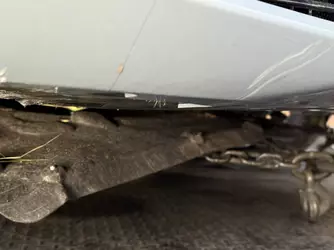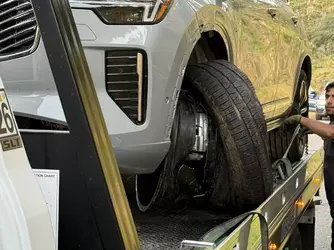
Source: Carscoops Archive: Ghost
Brake failure isn’t something most drivers expect, especially in a brand-new vehicle. But a recent incident involving a Volvo plug-in hybrid highlighted a software flaw serious enough to be at the center of a recall affecting nearly 12,000 vehicles. The problem, already identified by Volvo, surfaced in dramatic fashion after a troubling incident on a mountain road in California, and the driver involved reached out to Carscoops to share the details firsthand.
The owner, a California resident we’ll refer to as Max for privacy reasons, provided his full name and documentation to Carscoops. He reported a complete loss of braking and a subsequent crash while descending a steep mountain in his two-month-old Volvo XC90 PHEV. What made the situation more unsettling was that he had just received a software update at his local dealership.
As it turns out, Max’s vehicle is one of thousands affected by a recent recall warning drivers not to use one-pedal driving or B-mode. The recall covers the S60, V60, S90, XC60, XC90, XC40, EX40, EC40, and C40 models from the 2020 to 2026 model years. This same driver gave us a firsthand look at just how frightening the failure can be.
A Known Bug With a Very Specific Trigger

The issue occurred on May 13 and involved a Volvo XC90 Recharge that was running software version 3.5.14. We’ll circle back to that shortly, but it’s important to first point out that 3.5.14 is the same version that Volvo cautioned drivers about a few weeks ago. The problem included the loss of braking power after a driver engaged B-mode or one-pedal driving.
At the time, it specifically said that the issue only happens after “coasting downhill for at least 1 minute and 40 seconds.” That sounded oddly specific, and we pointed out at the time that it would be rare for most drivers to do that. Clearly, it wasn’t rare enough to avoid a recall, and now we know why: at least one driver experienced it firsthand and sent us the documentation to prove it.
The Harrowing Experience
Here’s how the driver described the event to Carscoops: “The brakes on my 2-month-old XC90 completely failed. This was just a few hours after receiving the software update version 3.5.14 at an authorized Volvo dealer. I was driving down a steep, narrow mountain road and was forced to steer off the road into the side of a hill to avoid going over a cliff.”
Roughly 1:40 into the descent, the vehicle begins to speed up without throttle input. Data from the onboard recorder shows that the service brake is on, but the car continues to speed up. At this stage, the driver simply wanted to avoid picking up any more speed, so they drove up onto the hill on the left.
Dirt flies, the car rocks, and then returns to the roadway. Thankfully, the brakes engage again, and the car stops, but the damage is done. Some airbags deployed, the front driver’s side wheel, tire, and suspension suffered damage, and the occupants were shaken up. In fact, the impact was so hard that the wheel itself split into pieces. Additional damage was done to the undercarriage.
Max later brought in a forensic accident reconstruction engineer to review the onboard data and footage. Their conclusion? “The Pre-Crash data corroborates [the driver’s] story that the vehicle brakes were not responding while coming down the hill. The speed increases in the five seconds prior to impact; there is no throttle application, but there is service brake application the entire time and no slowing down.”
Volvo Responds, But Concerns Remain

After reviewing the findings, we contacted Volvo for comment. The company responded with the following:
Safety is a top priority for Volvo Cars, and we are treating this incident seriously.
A recall was recently issued on certain plug-in hybrid and pure electric Volvo cars to address braking functionality that could potentially be affected after at least 1 minute 30 seconds of coasting downhill in ‘B’ mode or One Pedal Drive without applying the brake pedal. A review of the onboard data from this customer’s car indicates this scenario applied at the time of the incident, and we are working closely with them to rectify the situation.
We provided a software fix for this issue earlier in June and ask all owners with impacted vehicles to download the latest over-the-air update or take their vehicle to their nearest authorized Volvo Cars retailer to correct the issue. If they have not yet had the corrective software installed, they should not select ‘B’ mode or One Pedal Drive while driving.”
After inspecting the vehicle on June 27, Volvo told the owner it had completed repairs and installed the latest software update. It confirmed those repairs would be covered under warranty. Still, Max wasn’t satisfied with the company’s statement. “We almost died and they don’t even say they’re sorry,” he said, calling it a “lame response.”
Unanswered Questions
Volvo has actively engaged with Carscoops throughout our investigation, but there are still some unanswered questions. For example, we’re still waiting on an official chronology report to the NHTSA to understand how the company became aware of this issue.
We still don’t know exactly what it is about software version 3.5.14 that triggers the malfunction. It’s also notable that Volvo’s original guidance mentioned the failure could occur after one minute and forty seconds of coasting downhill. That threshold has since been revised to one minute and thirty seconds, a small but curious change that adds to the unanswered questions.
For now, owners included in the recall need to be very diligent. They either have to make sure that they’ve updated their software beyond 3.5.14, or avoid one-pedal driving or B-mode. It could save not just their cars but, much more importantly, their lives, and that’s what really matters to all parties involved here.



